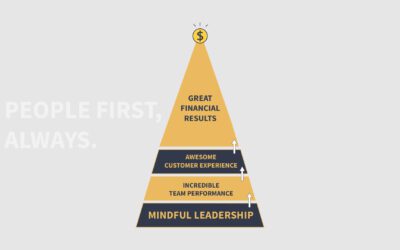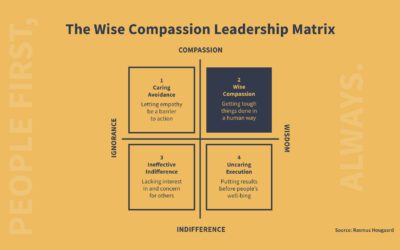9 Trends Shaping the Workplace in 2023: How Leaders Are Making Their Companies Employers of Choice in a Competitive Talent Landscape


Grant Ian Gamble is a best-selling mindful leadership author and speaker. He has over 30 years of experience in leading teams to create innovative customer experiences, building engaged workforces, and developing leaders who prioritize mindfulness in their approach.
(Please note: As a mindful leadership practice, I use the term “team member” in lieu of “employee.”)
The workplace landscape has shifted dramatically over the past two years. The COVID-19 pandemic has forced businesses to adapt to remote work and hybrid models, and team members have been feeling the effects of burnout more than ever before. In 2022, business leaders were faced with unprecedented challenges, and 2023 is no different. However, how leaders respond to these challenges could determine whether thir companies become employers of choice.
Based on Gartner research, here are nine workplace trends that highlight the aspects of work that leaders must prioritize:
1. Employers are “quiet hiring” in-demand talent.
In 2023, organizations are embracing “quiet hiring” as a way to acquire new skills and capabilities without adding new full-time team members. This involves encouraging internal talent mobility, providing specific upskilling opportunities, and leveraging alternate methods to bring in team members with specific skills for high-priority tasks.
2. Hybrid flexibility is reaching the front lines.
Frontline workers, such as those in manufacturing and healthcare, need equitable flexibility to adapt to a more permanent era of hybrid work. Organizations are investing in improving their team member experience, including offering control over work schedules and paid leave.
3. Managers are finding themselves sandwiched between leader and team member expectations.
People managers are struggling to balance their team member expectations with performance pressure from senior leaders. Leading organizations are providing fresh support and training to mitigate the widening managerial skills gap and redesigning their roles where necessary.
4. Pursuit of nontraditional candidates is expanding talent pipelines.
To fill critical roles, organizations are becoming more comfortable assessing candidates solely on the skills needed to perform in the role. This involves removing formal education and experience requirements from job postings and reaching out directly to internal or external candidates from nontraditional backgrounds.
5. Healing pandemic trauma is opening a path to sustainable performance.
As the immediate COVID-19 threat has receded, team members are contending with long-term physical and emotional impacts. Leading organizations are supporting their team members by providing proactive rest, discussion opportunities to work through challenges, and trauma counselors to train and coach managers on workplace conflict.
6. Organizations are driving Diversity, Equity, and Inclusion (DEI) forward amid growing pushback.
HR departments are equipping managers with tools and strategies to engage resistant team members and addressing pushback early before it evolves into more disruptive forms of DEI resistance. This includes creating group-specific safe spaces and upskilling team members with definitive “how-to” guidance that enables allyship.
7. Getting personal with team member support is creating new data risks.
While using emerging technologies to collect data about team members can enable employers to respond more effectively to team members’ needs, they also have the potential to create a privacy crisis. Leading organizations are creating a team member data bill of rights to support team members’ need for healthy boundaries and are prioritizing transparency around how the organization collects, uses, and stores team member data.
8. Concerns around AI bias are leading to more transparency in recruiting tech.
Organizations that use AI and machine learning in their hiring processes are facing pressure to get ahead of new regulations. This includes being more transparent about how they are using AI, publicizing their audit data, and giving team members and candidates the choice to opt-out from AI-led processes.
9. Organizations are addressing workforce-wide erosion of social skills.
To successfully create intentional interactions among team members, leaders are focusing on team member choice and autonomy, a clear structure and purpose, and a sense of levity and fun. Companies are positioning themselves for future success by designing robust future-of-work strategies that get ahead of these trends and address emerging challenges proactively.
The workplace landscape is constantly evolving, and leaders must adapt mindfully to keep up. The organizations that are succeeding in 2023 are those that are prioritizing acquiring and retaining critical talent, supporting all team members holistically, and confronting how they ethically collect and use team member data.

More Articles:
Unlock the Power of People: Transform Your Business with the AFFINITY Formula and AFFINITY OS
In a world driven by metrics and the relentless pursuit of growth, there’s a principle often overlooked—the essence of human connection. The AFFINITY formula is not just a theory but a realization of what truly drives success in any organization is the people. It’s about acknowledging that businesses don’t operate in isolation. They are living entities, shaped by the relationships between people.
Rediscovering Free Will: The Power of Autonomy and Self-Determination
In the complex tapestry of human existence, the concept of free will holds a prominent position. Victor Frankl, a renowned psychiatrist and Holocaust survivor, and Nir Eyal, a prominent author and behavioral designer, shed light on the significance of free will in our lives. Feeling autonomous and self-determined, that we have the power to exercise free will, is a fundamental psychological need that impacts our mental health. While it is easy to feel swept along by the current of life, believing we lack control over our outcomes, we must recognize our inherent ability to direct and redirect our path. Although we cannot change past decisions, the power to shape our current decisions and determine our direction lies within our grasp.
Cultivating Wise Compassion Leadership: A Necessity in Modern Leadership
I have been pondering on an article I recently came across in the Harvard Business Review, “Compassionate Leadership Is Necessary — but Not Sufficient,” written by Rasmus Hougaard, Jacqueline Carter, and Nick Hobson. I thought it could be of great interest to you as well.
As we navigate through turbulent times, the importance of compassionate leadership is more pronounced than ever. Yet, the authors reveal through their research that compassion on its own is not sufficient for effective leadership. Compassion must be paired with wisdom.
Fill out the form below and receive a PDF download of "6 Key Strategies to Engage Untapped Fitness and Wellness Market Segments"
Let's Connect!
CUSTOMER EXPERIENCE, TEAM ENGAGEMENT & WORKPLACE WELL-BEING: AFFINITY OS™ | WELLNESS INTEGRATION | MINDFUL LEADERSHIP: "THE AFFINITY PRINCIPLE"
0475 866 592

The Affinity Principle™ by Grant Gamble presents a formula for business success through a people-centric, mindful leadership approach.
PEOPLE FIRST, ALWAYS.




